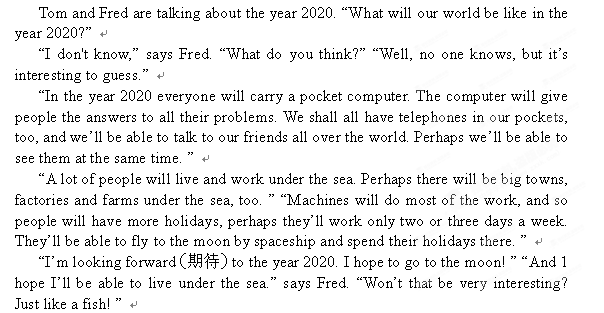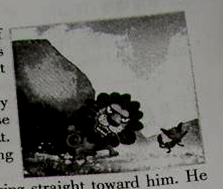题目内容
Danny is a schoolboy. He 36 in a small town. His home is about ten miles 37 school and the roads are not flat(平坦的). So it’s 38 for him to get to school. He 39 at about five thirty every day and has breakfast. Then he 40 school at around six o’clock. First, he 41 his bicycle to the bus station. That takes about forty minutes. 42 the bus takes him to school. It usually takes about thirty minutes. Sometimes he has 43 time for breakfast at home, so he has something for breakfast on the bus.
“I’ve never taken trains. It must be a lot 44 fun than taking buses,” says Danny. He studies very 45 at school. He hopes he can go to school in a big city some day. He can take a train to school then.
“I’ve never taken trains. It must be a lot 44 fun than taking buses,” says Danny. He studies very 45 at school. He hopes he can go to school in a big city some day. He can take a train to school then.
| 小题1: |
|
| 小题2: |
|
| 小题3: |
|
| 小题4: |
|
| 小题5: |
|
| 小题6: |
|
| 小题7: |
|
| 小题8: |
|
| 小题9: |
|
| 小题10: |
|
小题1:A
小题2:B
小题3:D
小题4:A
小题5:B
小题6:D
小题7:A
小题8:B
小题9:C
小题10:D
小题1:live in 表示在某地居住,为固定词组用法,故选A
小题2:离某地有多远,be +一段距离 from sp,表示离某地有多远,故选B
小题3:根据上文内容and the roads are not flat(平坦的),可知答案为D,表示难走的,故选D
小题4:根据上下文的内容He 39 at about five thirty every day and has breakfast可知答案为A,表示起床的意思。
小题5:leave for ,表示动身去某地,又因为主语为三单形式,故选B
小题6:ride one’s bike to sp,表示骑自行车去某地,为固定词组搭配,故选D
小题7:根据上文的first,故选A,表示然后的意思。
小题8:根据后文的内容so he has something for breakfast on the bus.,可知没有时间吃早餐,故选B
小题9:能够修饰比较级的词只有选项C。其余的选项都不能修饰形容词比较级,故选C
小题10:study hard 表示努力学习,符合题意,故选D

练习册系列答案
相关题目

 小题1:Tom and Fred talked about ____ .
小题1:Tom and Fred talked about ____ .